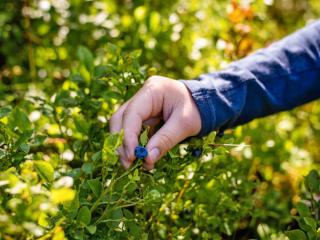

A cousin to the American blueberry, bilberry is a fruit that belongs to the Ericaceae family,
more specifically species of the Vaccinium genus.
Small blue-black colored berries with a delicate sweet taste, bilberries are the only plants that require aluminum-rich soil for them to grow well.
Often disputed by both humans and birds alike, the harvesting of bilberry is sometimes subject to legal requirements, such as in France where picking is dictated from one year to the next and depends on where you live.
Fresh bilberries are only available over a short span of time.
They only are open to harvesting within a period of 2 weeks, especially when harvested for commercial purposes.
Notwithstanding, these berries have high therapeutic and culinary properties for show, unequaled in the realm of plantdom. Which are these? How to they impact the human body? How should one use them wisely? What precautions must be checked before ingesting them?
The following lines will try to draft a rough answer…
On the European continent, bilberry has been used since the Middle Ages to treat diarrhea and helped work towards eradicating dysentery.
For centuries, up to the 20th century, bilberry was a staple of Western medicine.
Little by little, this plant was included as an ingredient when preparing remedies in folkloric herbal medicine.
Women ingested it to stop production of breast milk, while other nations used it to reduce sugar levels in the blood, treat circulatory disorders, diabetes, ocular diseases (cataract, glaucoma) and also scurvy.
However, on the North-American side, blueberries are more often available (picked by American Indian tribes of old), and the first pilgrims discovered their uses, similar to those of bilberries.
For the American Indians, its medicinal properties were very much appreciated and ranged from treating mental disorders to purifying the blood.
 Fruits with very little calories, the medicinal properties of bilberries are many. True antioxidants and rich in fiber, anthocyanin, plant pigments, malic and citric acid, hydro-soluble vitamins, anthocyanosides and indolic alkaloids, bilberries are very diuretic and act as hunger suppressants.
Fruits with very little calories, the medicinal properties of bilberries are many. True antioxidants and rich in fiber, anthocyanin, plant pigments, malic and citric acid, hydro-soluble vitamins, anthocyanosides and indolic alkaloids, bilberries are very diuretic and act as hunger suppressants.
This plant belonging to the Ericaceae family also imparts antinyctalopia, antihemorrhagic, anti-diarrhea and also antiseptic properties.
As for their effect on the body and health benefits, bilberries are acknowledged for:
– their capacity to treat digestive disorders since it encases tannin compounds,
– their astringent and anti-inflammatory activity.
Powerful antioxidant: scientists have shown that bilberry compounds support preventing cardiac diseases and oxidizing stress.
According to some researchers, bilberry juice seems to have on the one hand, a positive impact on memory, and on the other, the capacity to prevent degenerative diseases or cancers.
Bilberries are eaten fresh, or in pastries (pies and cakes).
Other manners of preparing it is in the culinary arts for syrups, liquor, herbal tea, jam, wine, spirits and even ice cream.
To boost cardovascular health, it is recommended to consume bilberries thus:
– infusion (in case of diarrhea) : pour 1 table spoon dried bilberries in ½ quart (½ liter) water. Let steep for 20 minutes. Filter. Drink about 3½ fl oz (10 cl) every 3 to 4 hours.
– fresh: eat 1 cup of fresh fruit a day.
– standardized extracts: usual dosage is 360 to 600 mg a day to ingest 25% anthocyanins.
– syrup (homemade): drizzle on crêpes, pancakes or waffles.
It isn’t recommended to ingest raw bilberries. In any case, ask for your consulting physician‘s opinion.